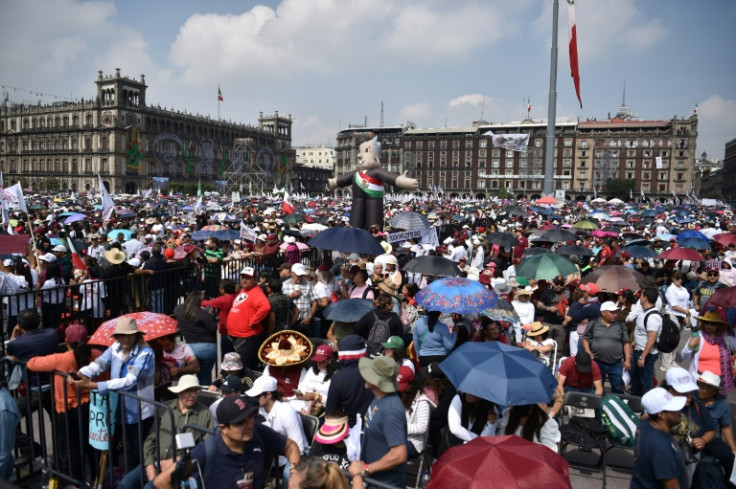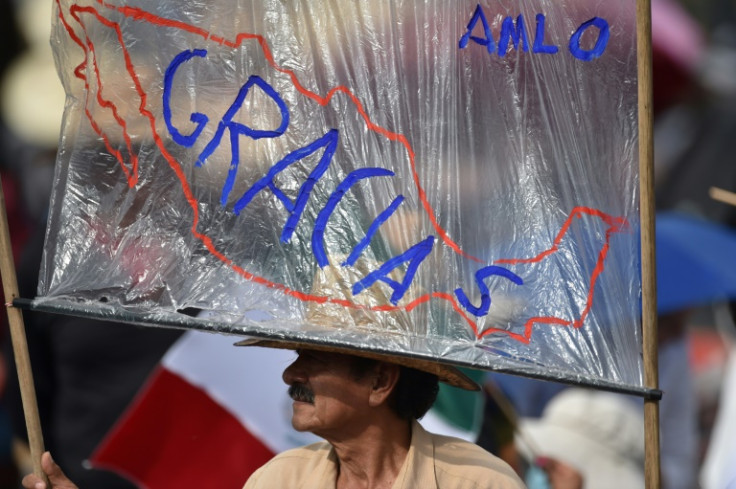A Popular Lopez Obrador Presents Final Report As Opponents, US Worry

Mexico's President Andres Manuel Lopez Obrador on Sunday presented the final report of his government, defending his legacy a month before turning power over to his successor -- along with a congressional supermajority and a highly controversial judicial reform plan.
In the Zocalo, Mexico City's sprawling central square, Lopez Obrador bade farewell to thousands of enthusiastic followers, buoyed by what polls say is a lofty 73 percent approval rating as his six-year term winds down.
"We are living in an true democracy, building a new homeland" and "laying the foundations to begin a new stage," he said in a speech that lasted nearly two hours.
A party-like atmosphere pervaded the square, which was filled with supporters -- and animated by musical groups and folk dancers -- two hours before the speech began.
Some attendees ate snacks under umbrellas, seeking relief from a hot sun, as they waited for Lopez Obrador, widely known by his initials AMLO.
"I came because it is the farewell of one of the most historic presidents in the country," Jose Luis Diaz, a 39-year-old entrepreneur, told AFP. "We won't see another president like him for 100 years."
Daniela Barrera, a 27-year-old who says she comes from an "Obradorist" family, said AMLO's greatest achievement was generating hope for Mexico.
The presidential report is a tradition in Mexican politics, an annual review of governmental progress not unlike a US president's State of the Union address.
On October 1, Lopez Obrador will hand power to a fellow member of his Morena party, Claudia Sheinbaum. Elected June 2 by an overwhelming 60 percent of Mexico's 36 million voters, she will be the country's first woman president.
Sheinbaum will also inherit a package of constitutional reforms initiated under Lopez Obrador, including a controversial reform of the judiciary that opponents see as a worryingly autocratic move by the governing party.
At the heart of that reform is a proposal to elect judges and magistrates by popular vote. The leftist government argues that the judiciary now serves the political and economic elite, not the public.
But detractors say the plan will dangerously politicize the justice system, compromising its independence. The proposal has already sparked a strike by affected workers.
For the United States -- Mexico's principal trade partner, buying 83 percent of its exports -- the reform represents a risk for democracy and a threat to the free-trade agreement linking the two countries and Canada, according to US Ambassador Ken Salazar.
In response, Lopez Obrador has decreed a "pause" in relations with Salazar -- though not with the administration of President Joe Biden.
The markets have also responded badly to the proposal. The Mexican bourse lost 2.8 percent of its value in August, and the peso depreciated, nearing the psychological barrier of 20 per dollar.
Canada's ambassador to Mexico, Graeme Clark, summarized investors' concerns this way: "They want stability, they want a judicial system that works if there are problems."
Although the reform plan reached Congress months ago, it will not be debated or voted on until a new legislature is seated on Sunday.
In the new congress, the governing Morena party and its allies will enjoy the supermajorities they achieved in the June elections, controlling two-thirds of seats in the lower house and nearly the same proportion in the Senate.
Their so-called qualified majority will allow them to modify the constitution without needing any opposition votes.
This will be the first time in this century that a Mexican government will enjoy a supermajority in Congress. The last time was in the 1990s, under the long-dominant Institutional Revolutionary Party (PRI).
Analysts and political opponents fear the supermajority will allow the governing party to build autocratic structures to preserve its rule.
The opposition filed suits with Mexico's electoral court both about the June presidential elections and about the distribution of legislative seats.
Opponents allege that Lopez Obrador interfered in Sheinbaum's favor during the campaign and that the ruling alliance in parliament was illegally overrepresented.
But the court dismissed the suits and completed its certification of results last week.
In past yearly reports, Lopez Obrador mainly highlighted his achievements in social policy, including extensive economic support programs for poor and vulnerable Mexicans.
On Sunday, the most widely seen signs around Zocalo Square were those that simply said "Gracias" -- "Thank you."



© Copyright AFP 2024. All rights reserved.





















